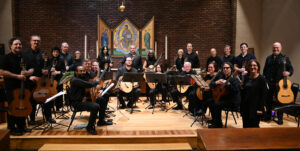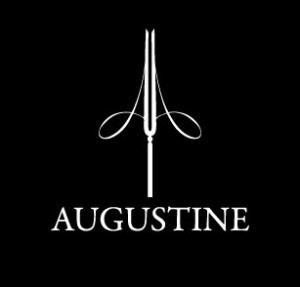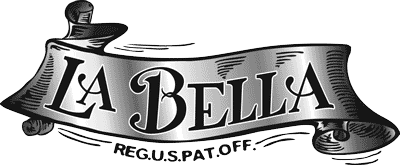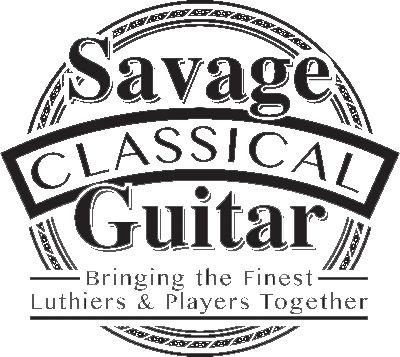by J. Andrew Dickenson
June 2004
Samba … caiparihnas … and of course, Villa-Lobos. Where else offers such rich culture for guitar? This summer you don’t have to fly all the way to Brazil to experience the wonderful offerings it has for musicians — Michael Newman and Laura Oltman are bringing it right here to New York.
The New York Guitar Seminar was conceived four years ago, when directors Michael Newman and Laura Oltman wanted to organize a festival with a focus on helping guitarists become well-rounded musicians. “Too many guitar students are completely into the technical minutiae, such as exact angle of nail, string gauge to the micromillimeter,” says Michael. “They lose sight of the forest for the trees. Remember that the guitar is only the ‘instrument’ for the much larger goal: Musical expression and communication.”
The first year included New York-based faculty such as David Leisner, David Starobin, Frederic Hand, and Newman & Oltman. Four years later, it’s still going strong and has become an exciting annual event for guitarists around the world. Students have come from Australia, Korea, Japan, Great Britain, Brazil, Canada, the Philippines, Peru, Colombia, Ecuador, Venezuela, Puerto Rico, and nearly half the United States to take part in the seminar’s festivities. It’s a week jam-packed with guitar goodies: Concerts, workshops, masterclasses, lectures, performance opportunities for students, outstanding faculty, and even a guitar giveaway! It’s clearly a week you’re not going to want to miss.
Every time I see Michael and Laura, they’re bubbling with enthusiasm. I asked the duo what inspired this year’s theme, “Brazil and Beyond.”
Laura Oltman: Brazil is an incredibly exotic place. Like many other countries in South America, it has a very strong guitar tradition and its musical culture is quite distinctive, both in its diversity and sophistication. We hope that is one of the main things people will discover at the seminar.
Michael Newman: As much as North American music (ragtime, jazz, blues, rock) has been influenced by African music, the connection seems even stronger — less diluted — in Brazil. The rhythmic vitality of the music is unbelievable. When Celso Machado — the confirmed master of ritmos brasileiros — does his session for all the participants of the seminar to learn these complex rhythms, it will be amazing.
Laura: Music for the guitar in Brazil has typically employed the kind of instruments and techniques that were brought from Europe, i.e., unamplified instruments played “fingerstyle.” This style of playing allows the instrument to produce a great variety of compositional textures. Composers and guitarists from Brazil have a high level of understanding of and familiarity with the guitar, which allows them to be very creative in their use of the instrument.
You two have traveled to Brazil a number of times. What attracts you?
Michael: Being able to spend time in a place and absorbing so much about the culture and the society gives you an unbelievable insight in what the music from that place is all about. This is true of anywhere, whether it is hearing jazz in New Orleans, Incan folkloric music in the Andes Mountains in Perú, or Rossini opera overtures in Milano. Brazil is a huge melting pot of cultures, and you just can’t even begin to get a sense of it all without spending time traveling in the country.
Laura: It is a place of such extremes, like wealth and poverty or natural beauty and natural dangers. There are difficult challenges under the circumstances. Brazil has tremendous resources that cannot be both exploited and conserved. The pressure of poverty makes decisions about these resources very complicated.
Michael: One of my favorite experiences in Brazil — other than watching all the incredible samba dancers in Rio de Janeiro and boi bumba dancers in Parentins on the Amazon River and drinking caiparihnas in the colonial city of Salvador overlooking the ocean — was spending an entire afternoon at the Villa-Lobos Museum in Rio. After seeing his guitar, box of cigars, hat, walking stick, and photos from his youth, we were invited to the music archives. Being able to turn the pages of his actual manuscript of the Preludes and the Etudes was like stepping back in time. The connection to the composer was palpable.
Laura: And on the extremes theme, on one of our visits we took a trip up the Amazon River to Manaus. We visited one of these eco-tourism jungle areas out in the varzea, which is sort of a swamp. All the buildings were afloat and people traveled around in canoes. There were some little kids out in their canoe paddling around with their pet sloth and generally having a good time. It looked quite idyllic until nighttime rolled around and we found out that the place was infested with cayman, which are these huge crocodile type reptiles that are very aggressive and happily attack people, especially small ones. Not quite idyllic! That isn’t including the boa constrictors, piranhas and, of course, malaria. Still, the Amazon is fantastic. We saw freshwater porpoises and rays. It turns out the Amazon used to flow the other way into the Pacific until the Andes popped up. A certain number of salt-water species got stuck in the middle and adapted to fresh water.
You have quite an outstanding crowd of performers at the seminar. Can you give NYlon readers a glimpse of what they can expect in the way of performers and the music they’ll be playing?
Laura: You will certainly hear some music that you might expect from Brazil, but you will also hear music that is not like anything you have heard before. If you went to Brazil you would find that everything is like that.
Michael: International artists making their New York concert debut performances are Celso Machado (São Paulo/Vancouver), Mario Ulloa (Salvador de Bahia), and The Guitar Project (NY/Baltimore). Fabio Zanon and Carlos Barbosa-Lima have played many times in New York, but rarely in such an intimate setting as in the Mannes Concert Hall. Mannes faculty Frederic Hand and Terry Champlin, along with our Newman & Oltman Guitar Duo, which serves as Ensemble-in-Residence at Mannes, will present a number of new works. With four full evening concerts, each one featuring two of the featured soloists or ensembles, people will hear all that wide variety Laura described. All of the evening concerts are being recorded by Robert Olmsted Recordings. The nationally-aired public radio show, Classical Guitar Alive!, will broadcast excerpts of the concerts during upcoming shows.
In addition to a lot of the traditional Brazilian repertory, there will be a ton of World, USA and New York City–premiere performances of new music composed by Arthur Kampela, Alexandre de Faria, Terry Champlin, Celso Machado, Lina Pires de Campos, Wellington Gomes, Leonardo Boccia, Darin Au, and Bryan Johanson.
The website for the seminar (www.mannes.edu/guitar) has full biographies about all the performers and teachers and has links to their websites. It also has links to all festival sponsors, complete schedule of events, and application form.
I also noticed that you’ll be giving away a guitar? That sounds like a chance worth its weight in the seminar fee!
Michael: Yeah, this is a great opportunity. And it costs the participants nothing. All full participants (limited this year to 50 guitar pickers from around the world) are automatically entered in the free drawing to receive a new Antonio Loriente handmade Spanish concert guitar, valued at nearly $2,000 and generously donated by Guitar Salon International.
NYGS is a great educational program. Have you seen an improvement in students and performers throughout the years?
Michael: We are thrilled to see some of the same participants return every year to the seminar. Their enthusiasm rubs off on everyone, and hearing their annual progress is a great inspiration to us.
I know you’re running around like headless chickens getting this year organized, but can you give NYlon readers a glimpse of what upcoming seminars will be like?
Michael: Plans include a tribute to Laura’s teacher, Bruce Holzman, who has taught many of this country’s competition winners; a French Connection year; artists and music from the Balkans; artists and music from throughout the United Kingdom and Ireland; and a tribute to our teacher, the Italian maestro Oscar Ghiglia. That should take us up to 2010, at least!
There are only a few openings remaining for full-time performing participants for this year’s seminar, but everyone is encouraged to come to New York for all the great concerts and other sessions, even if they are not performing in the masterclasses. We are very glad to be able to have affordable accommodations at nearby hotels, hostel, and New School University housing. And don’t forget to join us every day for lunch and dinner at all the incredible restaurants near Mannes. There are literally dozens and dozens of places within a ten minute walk. Hanging out with all the performers and teachers is a great part of the seminar.
Michael and Laura, thank you so much for your time. I wish you the best for this year’s seminar.









